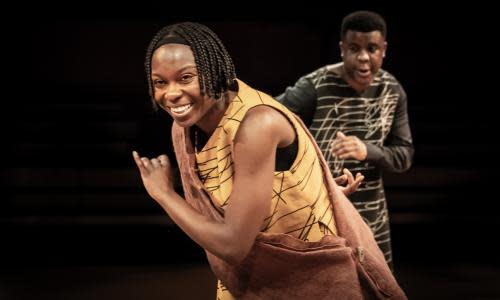Changing Destiny review – Ben Okri’s sketchy foray into ancient Egypt

Two towering pyramids dominate the auditorium, which is arranged in the round. The top structure laps with virtual flames and looks like a symbolic campfire, simultaneously state-of-the-art and ancient, around which this story will unfold. David Adjaye’s arresting set, floor to ceiling in size, is a wonder and the highlight of this play.
A pair of actors circle around it, out of character, drawing out the terms of the drama, and the pyramid’s fires change to Egyptian hieroglyphics to mark the beginning of Ben Okri’s story. It is based on a 4,000-year-old Egyptian poem, Sinuhe, about a royal official who flees the Egyptian court after hearing conspirators plot the pharaoh’s downfall and embarks on an epic journey. It is believed to have influenced major quest narratives around the world, foreshadowing Homer’s Odyssey, and its staging here serves as a recentring of the west’s literary legacy, of sorts.
All of this carries great promise of an inventive reopening show at the Young Vic, under the direction of Kwame Kwei-Armah. But Okri’s play does not materialise into a vivid enough story despite its visual boldness.
Sinuhe is a divided self here, his body played by Joan Iyiola and soul by Ashley Zhangazha (roles are assigned in a game at the beginning). The bottom pyramid is unfolded to create their dramatic space, and actors pick up props from the outer edge of their circle so that the story’s construction is built into the drama – though this meta-theatricality does not add much.
The bigger problem is Okri’s script, which raises ideas around identity, exile, leadership and the liberating aspect of immigrant reinvention, as well as the spiritual homesickness of the “foreigner”. But at just 70 minutes long, the story lacks detail, the characters (Sinuhe, as well as smaller parts played by Zhangazha) feel too generic and sketchy to allow the actors to bring much distinction to their parts, and the themes under-explored. The language is ponderous too, falling into a narration of its ideas, and the drama feels oddly stuck in the broadbrush realm of myths, abstractions and archetypes.
Yet there is still something vital in it; Changing Destiny sits in refreshing contrast to the glut of feelgood revivals and comforting classics currently being staged, which feel like a retreat into safe, anodyne territory. This blazes with risk and newness – and should be commended for that.
At Young Vic, London, until 21 August.

